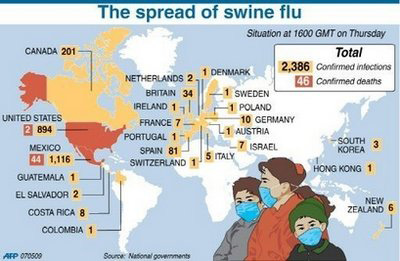
|  |  |  Editorials | Issues | May 2009 Editorials | Issues | May 2009  
Flu Quarantines Could Violate Law: U.N. Rights Chief
 Stephanie Nebehay & Laura MacInnis - Reuters Stephanie Nebehay & Laura MacInnis - Reuters
go to original


| | World map showing latest government figures for confirmed cases of swine flu infections and deaths. Global health chiefs warned against complacency over swine flu saying one in three people may be infected worldwide if there is a pandemic, as life in Mexico got back to normal. (AFP) |  |
Geneva - United Nations High Commissioner for Human Rights Navi Pillay urged countries on Friday not to quarantine healthy Mexican travelers on grounds of nationality, saying it was a violation of international law.

Dozens of Mexicans were placed in forced quarantine in China this week as a protective measure against the spread of the new H1N1 flu virus. Mexico called the Chinese action discriminatory. Beijing said it was purely medical.

"Mexicans who have no flu symptoms and have not been in Mexico over the past week are clearly no more likely to be carrying the influenza A-H1N1 flu than any other resident of the country where they are present," Pillay's spokesman Rupert Colville told a news briefing in Geneva.

Authorities had a duty to protect their citizens, but isolating individuals is only justified if there is a genuine risk based on medical realities including the incubation period, he said.

"No one should be placed in quarantine solely on the basis of their nationality. That would be an unacceptable and clear-cut case of discrimination," Colville said.

Discrimination on the basis of national origin is banned by the International Covenant on Civil and Political Rights, a landmark pact ratified by 164 countries, he said.

Mexico's ambassador to the U.N. in Geneva said he would raise concerns at the World Health Organisation's (WHO) annual assembly later this month about what he said were discriminatory measures imposed against it, its people and its exports because of the flu.

Ambassador Luis Alfonso De Alba did not single out China but denounced moves to quarantine or mistreat Mexicans because of their nationality.

DESTRUCTIVE MEASURES

WHO Director-General Margaret Chan also urged Asian health ministers to "refrain from introducing economically and socially destructive measures that lack solid scientific backing and bring no clear benefit.

"The rational use of travel- and trade-related measures is always wise at a time of severe economic downturn," Chan told them in a telephone conference.

The WHO may cut short its annual assembly as health ministers are needed at home to combat the spread of H1N1 flu, a spokesman said. Diplomats said consensus was building among the WHO's 193 member states to reduce the policy-setting assembly, set for May 18 to 27 in Geneva, to five days.

"It is definitely under consideration, it is a possibility," WHO spokesman Thomas Abraham told Reuters.

According to the latest WHO tally, 2,384 people in 24 countries have been infected with the newly emerged strain that scientists say is a mixture of swine, human and bird viruses.

Young adults have been most heavily infected by the new virus, which has killed 44 people, all but two in Mexico, according to the WHO.

Mexico is considered the epicenter of the H1N1 outbreak, and has 1,112 laboratory-confirmed cases to date. The United States has had 896 infections, including two deaths, while Canada has 201 cases and no fatalities.

The virus' spread in Mexico, the United States and Canada caused Chan to raise the global pandemic alert level last week to 5 out of 6, signaling a pandemic is "imminent." It would rise to phase 6, showing a full-blown pandemic, if it is clear the flu is spreading widely in a region outside North America.

Spain and Britain are the two countries in Europe with the highest numbers of confirmed cases, with 81 and 32 respectively.

(Editing by Janet Lawrence) |

 |
|  |



